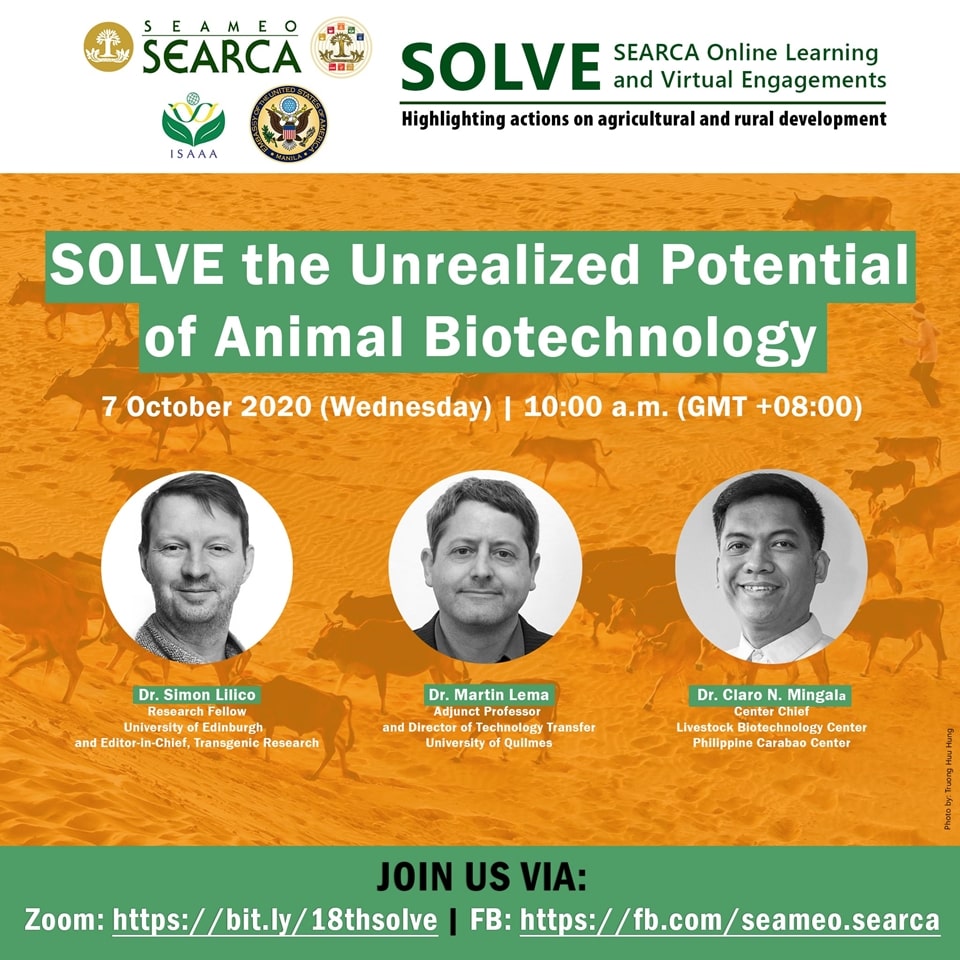Continuing its commitment in improving access to unbiased science-based information, SEARCA in collaboration with the United States Embassy Manila and the International Service for the Acquisition of Agri-biotech Applications (ISAAA) conducted the SEARCA Online Learning and Virtual Engagement (SOLVE) webinar on the "Unrealized Potential of Animal Biotechnology" on 7 October 2020 via Zoom and Facebook
As Filipino scientists direct their efforts towards animal biotechnology, the webinar presented an opportunity to share timely and credible information on the subject and dispel common misconceptions that affect the progress of maximizing its potential for improving countless lives especially those engaged in the agricultural sector.
The webinar had a great turnout, with more than 900 participants (134 in Zoom, 722 on Facebook) from the Philippines, Cambodia, Thailand, the United States, and Vietnam in attendance.

Opening the webinar, US Embassy Manila Chargé d'affaires (Acting Ambassador) John Law underlined the shared commitment of the USA and the Philippines to a science-based approach to agriculture. Both countries, together with a diverse group of nations, strongly support safe technologies by co-sponsoring an international statement on precision biotechnology at the World Trade Organization. “The Philippines is continuing to demonstrate its commitment and leadership in the global stage in providing farmers the tools they need to address the array of challenges we face in producing safe, sustainable, and abundant food, feed, and energy,” he stated. He also highlighted the 10-year Science and Technology Agreement between USA and the Philippines. “This Agreement celebrates the strong cooperation between US and Philippine research institutions and expands our joint activities in agricultural, environmental, and health sciences,” John Law added.
Experts and scientists from Argentina, United Kingdom, and the Philippines were brought in to share their expertise on global and local animal biotech applications as well as the regulations and challenges in the field.
As in other webinars that are part of this year’s biotech outreach series, Dr. Simon Lilico of the University of Edinburgh presented the global state of animal biotechnology and introduced current initiatives being done and technologies being explored in other countries.
Dr. Martin Lema of the University of Quilmes, Argentina continued with providing a broad perspective on regulatory frameworks applied to the genetic improvement of animals using innovative breeding tools like marker-assisted breeding, cloning, transgenesis, and genome editing. Dr. Lema also emphasized the need for a sound regulatory framework on animal biotech. “If the Philippines has the opportunity to revise regulations on animal biotechnology, it can provide the capacity to assess if these technologies may be used for food production in the country and contribute to food security and a more sustainable agriculture,” he said.
Lastly, Dr. Claro Mingala of the Philippine Carabao Center gave an update on initiatives being done locally. He said that since the use of GMOs in the country is still confined to biotech crops, the benefits from animal biotechnologies in the Philippines are in the developed rapid animal disease test kits, reproductive biotechnologies, and product development.
Dr. Mingala also cited potential benefits of animal biotechnologies for Filipino farmers in conjunction with proper animal management such as increased income of livestock food producers, doubled food production to meet the supply in demand, creation of climate change and disease resilient or resistant animal and development of rapid diagnostics and modern animal disease surveillance. In closing, he pointed out that the Philippines is not far behind in terms of animal biotechnology applications. “Biotech has a lot of potential in increasing our livestock production, but it is only one of the options. Biotech does not take your freedom of choice. We agree what biotechnology offers to farming communities - to sustain of food and food security. As scientists, we are here to help achieve a food secure community.”
The experts then addressed questions and concerns from participants ranging from animal welfare, food security and safety, benefits of animal biotech, future of animal biotech research in the Philippines, and regulatory policies.
The SOLVE webinars aim to provide an avenue for knowledge sharing on concrete innovative actions on the ground along SEARCA's 11th Five-Year Plan (2020-2025) via technology-mediated social platforms that would directly benefit farmers and farming families and engage the youth in ARD. Launched on 28 April 2020, the SOLVE webinars use the popular online platforms Zoom and Facebook and are livestreamed to interested audiences anywhere in the world.